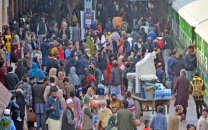Echoes of 1971: Dhaka court sentences Jamaat leader to death
The verdict sparks fresh protests and riots in the country.

The verdict sparks fresh protests and riots in the country. PHOTO: REUTERS
Bangladesh’s Supreme Court on Tuesday sentenced a senior leader to death for mass murder, toughening a punishment originally handed down by the country’s war crimes tribunal and sparking fresh violence.
Abdul Quader Molla, 65, the fourth-highest leader of the Jamaat-e-Islami party, was given a life sentence in February by Bangladesh’s International Crimes Tribunal.
The tribunal has since January convicted six people of crimes related to the 1971 war, in which pro-independence fighters battled Pakistani forces which were helped by local leaders.
Molla’s life sentence had sparked deadly protests and widespread riots and there was fresh unrest Tuesday in the port city of Chittagong after he was sentenced to hang.
“There were about 2,000 Jamaat protesters. They rioted, torching a police van and a private car,” police chief Mohammad Mohiuddin told AFP, adding police fired rubber bullets and tear gas to disperse demonstrators.

There were also clashes in the capital Dhaka and other cities and towns, police said. Outside the northern city of Bogra, a policeman was hurt when protesters hurled small bombs, police inspector Fazlul Karim told AFP.
Molla was convicted of rape, murder and mass murder including the killing of over 350 unarmed Bengali civilians, a poet and a top journalist during the war, when he was a physics student at Dhaka University.
Prosecutors described him as the “Butcher of Mirpur”, a Dhaka suburb where he committed most of the atrocities.
The war led to the creation of Bangladesh from what was then East Pakistan.
Published in The Express Tribune, September 18th, 2013.



















COMMENTS
Comments are moderated and generally will be posted if they are on-topic and not abusive.
For more information, please see our Comments FAQ